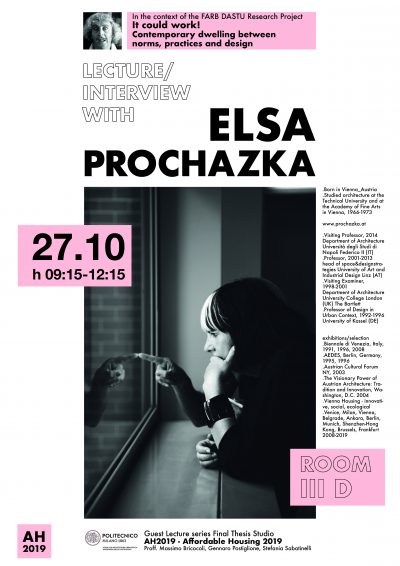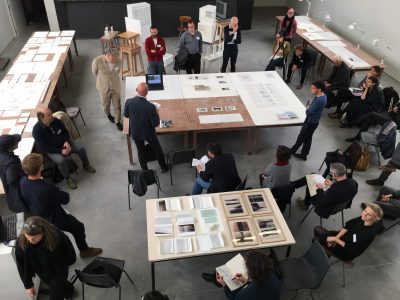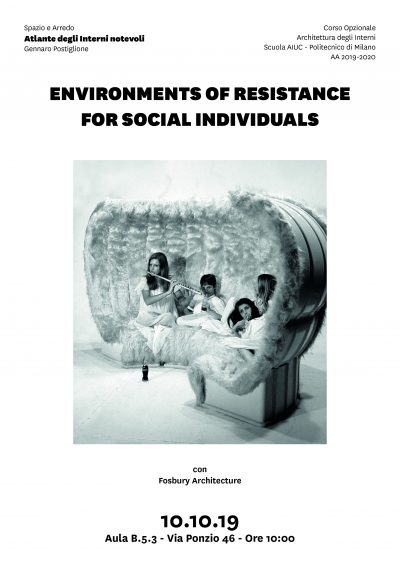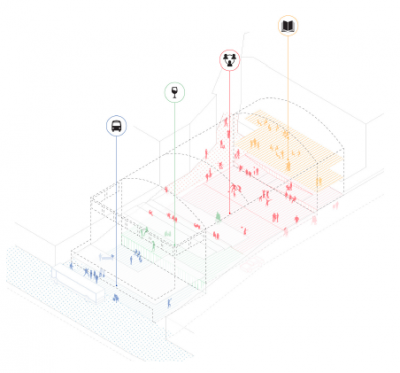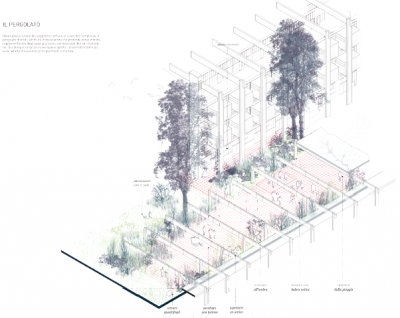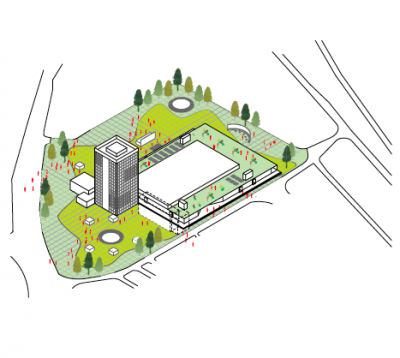Archive for 2019
Spazio e Arredo/Guest Lecture
Thursday, November 14th, 2019Affordable Housing Studio / Guest Lecture #03
Monday, November 4th, 2019AMa2019 Housing Seminar #03
Friday, November 1st, 201915th November 2019 / 10 00 – 13 30
Politecnico di MIlano
Aula Rogers, Via Ampère 2
Lectures by
Hans van Heeswijk architecten (NL)
Mae (UK)
Beta Office (NL)
The seminar is inspired by the increasing number of interesting projects and architectural practices dealing with spatial, typological and technical innovation connected to the regeneration of existing buildings all over Europe toward residential and community spaces. The seminar is interested in crossing different experiences that work on: the regeneration of existing collective housing, the regeneration of peripheral areas and fragile context, the unconventional reuse of the nonresidential, underused or abandoned buildings. All these topics combine many issues: the typological innovation in relation to contemporary practices, the work on the envelope, the layout articulation, the image of the building, the participation of the community, the effects that these projects can produce on urban scale.
Affordable Housing Studio / Guest Lecture #02
Monday, October 21st, 2019Affordable Housing Studio / Guest Lecture #01
Monday, October 21st, 2019TACK: Call for 10 International PhD Positions
Saturday, October 12th, 2019Lablog@CA2RE+Ghent
Saturday, October 12th, 2019CA2RE+
3-7 October 2019
KU Leuven Sint Lucas – Ghent
The Erasmus+ Strategic Partnership CA2RE+ develops a collective learning environment through Evaluation of Design Driven Doctoral Training. Design Driven Doctoral research (DDDr) is taken as a multidisciplinary example of an experiential learning-through-evaluation model, appropriate for identification and promoting relevance of research singularity, its transparency and recognition, to award excellence in doctoral training for creative and culturally rooted solutions of contemporary design driven developments.
Guest Lecture 10OCT2019
Sunday, October 6th, 2019MEMI-Fest
Sunday, September 1st, 2019MEMI FEST – Attiviamo la Memoria
Il primo festival urbano dedicato ai luoghi della Memoria a Milano
11-15 Settembre 2019, Milano
La prima edizione del Festival si terrà in 17 luoghi della memoria a Milano e coinvolgerà 11 artisti/compagnie/associazioni che in ogni luogo proporranno visite guidate, itinerari urbani, performance e spettacoli utilizzando la loro arte ed esperienza per comunicare la memoria e trasmettere valori e storie.
Obiettivo del festival è dare nuova vita ai luoghi della memoria raccontando le vicende e le storie che hanno caratterizzato il decennio 1938 – 1948 attraverso la partecipazione e il coinvolgimento attivo degli abitanti.
Cartella stampa
Anteprima del Festival (9-11 Setembre)
Calendario degli spettacoli
www.me-mi.it
CIÖNDÒL
Wednesday, July 31st, 2019CIÖNDÒL
[by Irene Comini, July 2019]
Borno è un borgo alpino della provincia di Brescia che per posizione geografica risulta isolato rispetto al suo contesto territoriale. Se per molti borghi alpini questo causa un progressivo spopolamento, il forte radicamento dei bornesi nei confronti del paese natale porta la maggior parte di loro a preferire uno stile di vita mobile, impiegando fino a tre ore di viaggio per raggiungere quotidianamente il luogo di lavoro o di studio. Attraverso un intenso lavoro di interviste semi-strutturate e un confronto diretto con i “bornesi mobili” è risultato evidente come questo stile di vita limiti il loro coinvolgimento nella quotidianità e socialità del paese.
Partendo dallo stato famigliare, dalla frequenza e dal motivo dello spostamento, e attraverso la ricostruzione delle diverse giornate tipo, sono stati identificati sette ritratti di persone mobili che differiscono per abitudini, pratiche, esigenze, spazi e tempi vissuti.
CO-LIVING
Wednesday, July 31st, 2019CO-LIVING
[by Laura Vanazzi, July 2019]
This research is inspired by the studies in Politecnico di Milano at the department of Architecture and Urban Studies about the evolution of dwellings practices and the need of new spaces, policies and processes, in the contemporary housing scene in Italy. What emerges is a widespread of co-living practices, which do not regard only Italy but the entire world. Stimulated by these previous analysis, the thesis explores the topic of the co-habitation in order to construct a solid panoramic view and propose a design strategy for a co-living apartment.
RIPENSARE GLI SPAZI DELL’INFRASTRUTTURA
Wednesday, July 31st, 2019RIPENSARE GLI SPAZI DELL’INFRASTRUTTURA
[by Antonio Lento, April 2019]
Attraverso la ricognizione del dibattito che essi hanno prodotto, la tesi tenta di definire il proprio orizzonte problematico, ponendosi tre domande: quale ruolo l’infrastruttura ha assunto nel territorio urbano? Come la città può riappropriarsi degli spazi negati all’infrastruttura? Di quali valori sociali gli spazi infrastrutturali sono portatori?
IL TEMPO CHE SFUGGE ALLA STORIA
Wednesday, July 31st, 2019IL TEMPO CHE SFUGGE ALLA STORIA
[by Miriam Tinto, April 2019]
Il lavoro di ricerca e progetto nasce dal paradosso dell’abbandono più che ventennale di un capolavoro – due volte vincolato – dell’architettura moderna. Manufatto segnato da grande fortuna critica e annoverato tra i rari esempi di brutalismo italiano, l’Ex Istituto Marchiondi Spagliardi di Baggio è stato recentemente oggetto di diverse ipotesi di intervento di recupero destinate purtroppo a fallire, anche a fronte di una ormai eccessiva insostenibilità economica dell’operazione.
Se normalmente si pensa a rovine e macerie come prodotti del conflitto bellico, è corretto pensare al presente del Marchiondi non solo come prodotto di un conflitto amministrativo ma anche come risultato di un gap nel dibattito teorico, pratico e culturale italiano intorno al recupero dell’architettura moderna e contemporanea d’autore.
YOUTH COMMUNE
Wednesday, July 31st, 2019YOUTH COMMUNE
[by Vigan Zika, April 2019]
The “Rilindja” Media House building, was one of the victims of this process, its architecture, program and history were altered, it lost its importance, and as a result, a huge part of the architectural and historical heritage of Kosovo was erased.
These aspects introduced two key questions for the project: how a disfigured building in the city of Pristina can be transformed into an active social intersection between the city and its citizens? and how does the present situation affect the memory of the past?





